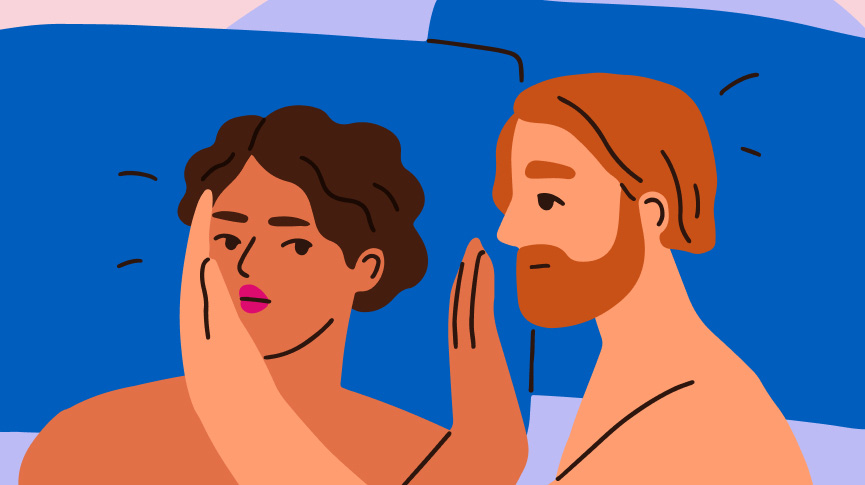Causes of Low Desire and How to Address Them

All couples evolve, and with them, so do their sexual relationships. It’s normal for sexual desire to increase and decrease, as it depends on countless factors unique to each person (biological, psychological, emotional) and life changes that affect a couple (responsibilities, children, financial problems, etc.).
However, if low sexual desire affects your relationship, it’s necessary to identify the cause and address it to prevent irreparable damage. In this article, we’ll explore the causes and key strategies to tackle them.
The Three-Year Crisis
When we fall in love, the desire for the other person sweeps us away as if it were a drug, and in a way, it’s due to the novelty and the cocktail of hormones flooding our brains, especially serotonin (a neurotransmitter that regulates sexual desire).
Serotonin levels spike so much that they create happiness and euphoria similar to the highs induced by drugs like ecstasy or LSD, leading to a form of addiction.
Serotonin is also linked to other neurotransmitters and hormones like dopamine, norepinephrine, phenylethylamine, oxytocin (the “love hormone”), and testosterone – substances that influence emotions such as trust, tenderness, longing, euphoria, and pleasure. This explains why, at the start of a relationship, couples often can’t bear to be apart (or leave the bed).
However, this hormonal high has an expiration date – approximately three years. Around this time, many couples face their first crisis, wondering if they are no longer in love and if the decline in desire signals the end of their relationship. But this doesn’t have to be the case, unless their bond is based solely on sexual pleasure and fun.
If there is a solid foundation – desire, affection, tenderness, friendship, complicity, admiration (in other words, love) – the relationship will continue evolving on a deeper level, where desire manifests with varying intensity and in different ways.
What Type of Lack of Desire Are You Experiencing?
If your relationship is well-established and one or both of you are experiencing very low libido that affects your connection, the first question to ask is whether this lack of desire is general or just between the two of you.
If the decrease in desire is general, you might be experiencing female sexual interest disorder or male hypoactive sexual desire disorder. These dysfunctions are characterized by a reduced (or absent) interest in sexual activity, erotic thoughts, or fantasies, as well as a lack of response to sexual stimulation – whether physical (such as lack of lubrication or erectile issues) or mental/emotional – causing distress, dissatisfaction, and frustration.
Although men and women experience these disorders differently, their origins can be physiological, psychological, emotional, or a combination of the three, with a strong hormonal component.
- In women, fluctuations in estrogen levels (the main female sex hormone) affect not only physical arousal (elasticity and lubrication) but also mental arousal. Estrogen is linked to “happiness neurotransmitters” (endorphins, oxytocin, serotonin), meaning that the higher their levels, the greater the sexual desire – and vice versa.
- In men, the most significant cause of loss or lack of sexual desire is low testosterone levels – the primary male hormone responsible for regulating arousal and sexual desire.
Thus, hormonal fluctuations can impact sexual interest and arousal temporarily or over time.
What Causes These Hormonal Changes?
- Natural life stages: Andropause, menopause, and pregnancy.
- Diseases and dysfunctions: Vascular, heart, and nervous system disorders, diabetes, endometriosis, pelvic floor dysfunctions, vaginismus, hypogonadism, vaginal dryness, genital surgery (such as an episiotomy), fatigue, anxiety, depression, among others.
- Medications: Antidepressants, anticonvulsants, blood pressure medications, opioids, and chemotherapy.
- Harmful habits: Especially alcohol, smoking, and poor diet.
If the lack of sexual desire is general, it is crucial to see a doctor to identify the root cause and receive appropriate treatment.
However, if no medical condition or medication is responsible, or if the lack of desire occurs only within the relationship, other factors might be at play.
Communication Problems
The most common complaint in couples therapy is lack of communication and the psychological, emotional, and sexual problems it creates – such as frustration, resentment, low self-esteem, anxiety, emotional distance, and decreased sexual desire.
One of the main causes of lost desire in a relationship is anger or resentment toward a partner – whether for ignoring needs, being overly critical, demanding, dominant, passive, or indifferent. If left unresolved, this can ultimately lead to a breakup.
A painful ending that could be avoided through assertive communication – expressing oneself in a direct, balanced, sincere, and respectful manner, without judging, criticizing, making assumptions, or blaming the other person. Instead, assertive communication involves respecting and empathizing with your partner’s thoughts, feelings, and needs.
Thus, the first step to preventing and resolving relationship conflicts is openly expressing (and allowing your partner to express) thoughts, feelings, and desires (including sexual ones) in search of a mutually beneficial solution.
Stereotypes and Sexual Education
Pornography and restrictive or nonexistent sex education have created harmful stereotypes that fill us with trauma, fear, and unrealistic expectations that we need to eliminate.
- Women have been bombarded with negative messages about sexuality, the right to enjoy it, and the “appropriate” age for doing so.
- Men have been taught to associate their masculinity and identity with sexual performance, penetration, and orgasm – placing immense pressure on them to be “sex machines” that guarantee their partner’s pleasure.
This leads to common issues:
- For men, the fear of “not performing as expected” contributes to low desire and erectile dysfunction.
- For women, guilt over feeling sexual desire and body insecurities (overthinking how they look during sex) contribute to low desire and difficulty reaching orgasm.
It is crucial for men to redefine “sexual performance” – it is not about mimicking porn scenes. Women, in turn, must let go of guilt and stop thinking they are “weird” or “promiscuous” for embracing their natural sexuality.
To live a healthy and fulfilling sex life, we must replace negative conditioning with messages that normalize and celebrate sexuality as something natural and enriching.
Apathy and Lack of Eroticism
Over time, many people lose interest in eroticism and sexual play. They become less imaginative, less proactive, stop fantasizing, and lose excitement over things that once turned them on.
One reason is lack of sexual stimuli – when we are too focused on other matters, we fail to notice things that would otherwise ignite desire. This creates a vicious cycle: the fewer sexual stimuli we provide to our brain, the less receptive it becomes, leading to greater sexual apathy.
To break this cycle, we need to feed our minds with stimuli – erotic literature and films, flirty conversations, touches, kisses, and sexual exploration, both alone and with a partner.
Stress, Exhaustion, and Routine
The demands of work, financial struggles, parenting, household chores… Living in a fast-paced, demanding society drains us, weakens us, and even makes us sick. Stress, anxiety, exhaustion, and lack of sleep take a toll on our well-being, making it hard to enjoy life – and affecting sexual desire and arousal.
To combat this, prioritize urgent tasks, delegate responsibilities, and make time for neglected aspects of your life that are essential for emotional balance.
A couple must also make space for their relationship – separate from work, family, and societal obligations. Strengthen intimacy and enrich your sex life – not just as intercourse but through affection, laughter, tenderness, and connection.
Simple actions can help – plan romantic getaways, engage in activities together, cook a special dinner, cuddle while watching a show… Nurture your relationship to prevent monotony.
Final Thoughts
It is normal for sexual desire to fluctuate, but if it becomes a problem, it’s essential to identify the cause and address it through communication, respect, and love. Sometimes, professional help (medical or therapeutic) is necessary. Your love deserves it.

Gema Bocardo. Licenciada en Derecho, escritora y redactora. Apasionada de la criminología, la psicología y la sociología, ahonda en sus artículos sobre la importancia de conocerse a uno mismo y a los otros, y desarrollar habilidades efectivas de crecimiento personal, comunicación y relaciones.


